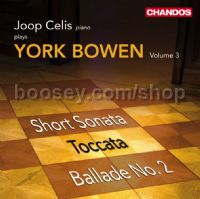Piano Works vol.3 (Chandos Audio CD)
Piano Works vol.3 (Chandos Audio CD)
* Estimated price converted from UK retail price
Joop Celis presents his third foray into the Solo Piano Works of York Bowen. The previous two volumes have been highly praised. Following Volume 1, International Record Review described Celis as a ‘thoroughly sympathetic advocate of Bowen’s work… powerful and poised, nimble and sensitive’. Classic FM wrote of Volume 2, ‘Celis deserves the highest praise for his powerful advocacy of this passionate and appealing music, heard here in warmly-recorded sound’. Gramophone was equally complimentary: ‘Joop Celis confirms his stature at every point.’
The music of Bowen is timeless and very individual, setting him apart from many of his British contemporaries. It was in his solo piano music that he contributed the most, for it was the piano, above all, that was his natural, and most often turned to, instrument of expression.
In this collection we range widely over Bowen’s solo piano output, from the larger, demanding, virtuoso Second Ballade in A minor, dating from about 1930, to the Three Miniatures, composed fifteen years previously following Bowen’s being invalided out of the Scots Guards. The earliest works on this volume are the Three Pieces, Op. 20, written around 1905. The piano writing is superb, perhaps influenced by Fauré and certainly impressionistic in intent; they reveal a young master’s mind. Robert Matthew-Walker writes of Bowen’s Short Sonata, Op.35 No.1, ‘it is one of the gems in Bowen’s entire solo piano output; its melodic inspiration is first-class and the treatment of the material is quite masterly and wholly organic… utterly delightful’. The Toccata came relatively late in Bowen’s career, dating from 1957. This most brilliant work was first premiered by Bowen himself and, considering the virtuosity of the work, remains a striking example of how the composer maintained his keyboard technique until the end of his days. Matthew-Walker writes, ‘there is no finer example of the genre in the British solo piano repertoire – and one would be hard-pressed to find its equal by any twentieth-century composer of whatever nationality’.
In 1945, in an interview, Bowen said, ‘I have always tried to compose modern music that is still music’. From a distance of more than sixty years, and through the irresistible advocacy of Joop Celis, we may appreciate his aesthetic objective, and how well he accomplished it.




